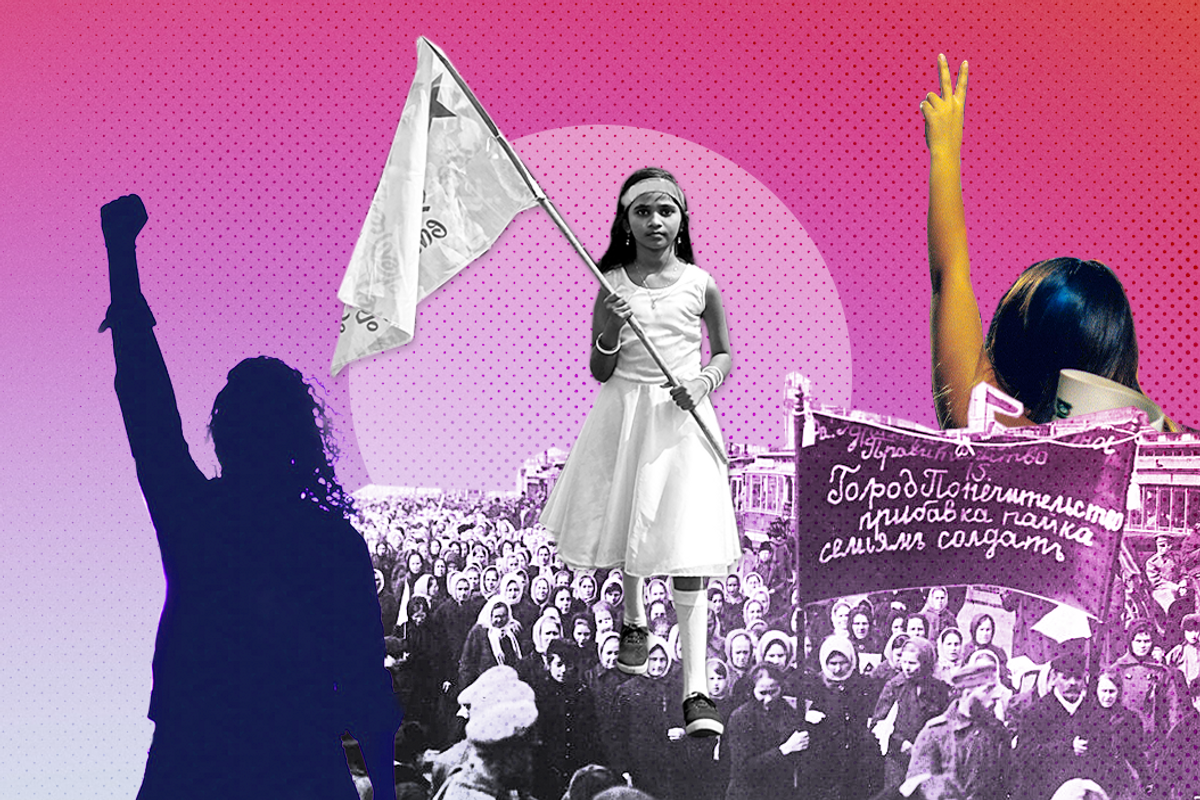This Monday, March 8, is International Women's Day, a holiday with roots in a protest led by the Russian feminist Alexandra Kollontai that helped topple the czar of Russia in 1917. More than a hundred years later, amid a global pandemic that has affected women with particular fury, there are dozens of women-led protests and social movements reshaping politics around the globe. Here we take a look at a few key ones to watch this year.
Mexico. Latin America's second most populous country heads into March 8 embroiled in a major #MeToo political scandal, as President Andrés Manuel López Obrador defends a powerful member of his party accused of sexual harrassment and rape. That alone is fueling what are likely to be sizable protests this weekend, but there are two other big issues that have spurred the women of Mexico to action in recent years. The first is a growing crisis of femicide — in Mexico last year, a woman was killed every 8 hours (Spanish). The numbers got worse during the pandemic, when quarantine rules forced many women to stay at home with abusive partners or family members. The second is the growing movement to change Mexico's restrictive abortion laws, which strictly limit the procedure in most places outside the capital city. While public opinion is divided on the issue, feminist leaders in Mexico are looking to the recent success of the abortion-legalization movement in Argentina — part of a broader "Green Tide" of feminist organization and power across Latin America.
Poland. Earlier this year, the Polish government approved a draconian new abortion law — now among the strictest in the EU — that all but eliminates women's right to terminate pregnancies legally. Throughout the pandemic, protest groups led by women have hit the streets in opposition to the measure, which is supported by the ruling rightwing Law and Justice Party, but opposed by a majority of Poles. And while protests have died down since the law was passed, it will be a fresh focus this weekend. More broadly, the debate over abortion has become a totem of the wider cultural and political clash in Poland, which pits a conservative national government with strong ties to the Catholic Church and a largely rural political base against an increasingly liberal opposition in the country's big cities. Polish pro-choice activists face an uphill battle, but again — so too did those in Argentina, where the campaign lasted some 15 years.
India. By now you've doubtless heard about the massive farmers protests roiling New Delhi. (If not, see here.) But you've probably heard less about the sizable role that women are playing in the movement, as participants, speakers, and organizers. It's not hard to see why. Consider that 80 percent of working women in India are employed in the farming sector, and half of India's self-employed farmers are women. That means the government's new agriculture liberalization laws — which farmers worry will put them at the mercy of conglomerates — will have a huge impact on India's hundreds of millions of rural women. This issue has become the single biggest political crisis of otherwise-popular Prime Minister Narendra Modi's tenure.
Australia. In Australia, a rape allegation made by a former staffer for the ruling Liberal party has dominated the country's politics in recent weeks, causing a stream of women to come forward with stories of sexual harrasment and assault in Australia's Parliament House, including a separate decades-old allegation of rape against the current Attorney General. Brittany Higgins, an alleged victim who has become the face of the growing movement, says she felt silenced by the government after coming forward in 2019, prompting Prime Minister Scott Morrison to call for an inquiry into the parliament's "workplace culture." A slew of female politicians — from parties across the spectrum — have left politics in recent years because of what many say is the pervasive misogyny of Canberra's old boys' club. (You may recall former Prime Minister Julia Gillard's now-famous misogyny speech from parliament in 2012.)
Japan. Around the globe, women have suffered disproportionately from COVID's social and economic aftershocks. In Japan — where biases that disadvantage women are deeply ingrained — that toll has been especially pronounced: about 7,000 Japanese women committed suicide in 2020, a 15 percent annual increase (the number of Japenes men who committed suicide decreased from the previous year). While the subjugation of Japanese women is not new — Japan currently ranks 121st out of 153 countries on the World Economic Forum's annual Gender Gap list — the way that women in particular are responding to the issue is new. More assertive women's right advocates and groups have begun mobilizing to shine light on the conditions that lead to Japanese women's experiences of alienation, helplessness, and depression. One particular focus in recent years has been the push for reforms to the country's archaic rape laws, which critics say place an unreasonably high burden of proof on alleged victims (victims need to prove that they "fought back" during an assault).
Bottom line: International Women's Day can sometimes fall prey to a kind of cultural kitsch, with lazy appeals to "girl power" and cringey hashtags. But for many women around the world, it's a day to celebrate how far societies have come in the fight for equality, and to reflect on how far we still have to go.
- US women soccer team’s fight for equal pay "because we're clearly the dominant team" - GZERO Media ›
- Activist Loujain al-Hathloul is far from free in MBS's reformed Saudi Arabia - GZERO Media ›
- The global battle over reproductive rights - GZERO Media ›
- International Women's Day 2021: when women flooded the streets - GZERO Media ›
- How education has improved women’s lives around the world - GZERO Media ›







